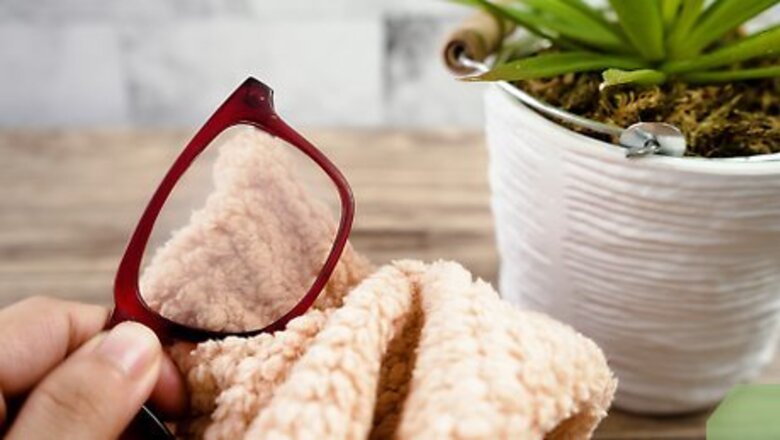
views
- Rub a drop of dish soap into each lens using your wet fingers. Rinse them off with water and blot them dry with a microfiber cloth.
- Alternatively, spritz cleaning spray onto your lenses and wipe them down with a microfiber cloth.
- Avoid cleaning your glasses with your own clothing, or with cleaners like vinegar or bleach.
Soap and Water
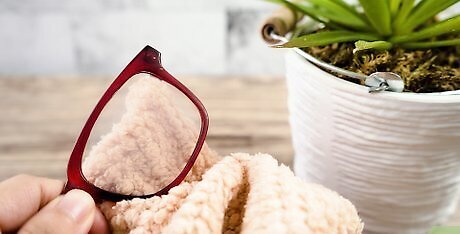
Wipe down your lenses with a clean microfiber cloth. Hold your glasses by the arm and use a clean and dry microfiber cloth to wipe down each lens. Remove any dirt or dust that you can see from the lenses to make them easier to clean.Warning: Never use paper towels or tissues to wipe your glasses, as these products can scratch the lenses.
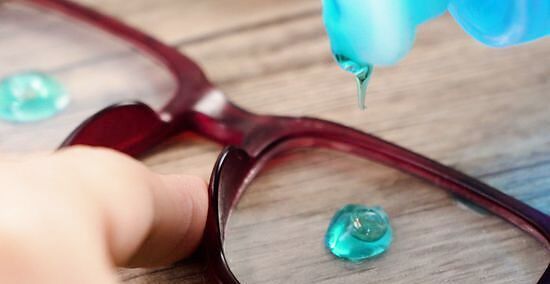
Add 1 drop of dish soap to each lens. Use a mild dish soap that is fragrance and dye-free. Pour a single drop of dish soap onto each lens to use as a cleaning agent. Do not use moisturizing soaps, as those can leave smears and residue on your lenses.
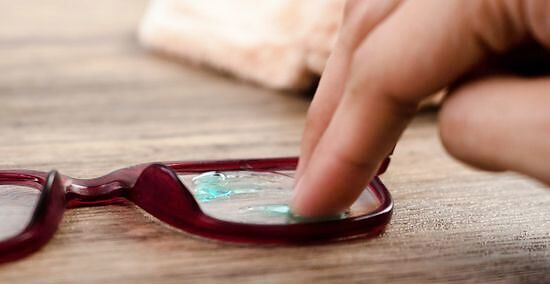
Wet your fingers and rub the dish soap onto the lenses and frames. Run your fingers under some lukewarm water. Use your hands to gently rub the soap all over the lenses and the surrounding frames. Wash the front and back of each lens and pay special attention to any areas that are cloudy or greasy. The inside of the lenses near your nose often get more greasy and dirty than the rest of the lens. Pay special attention to these areas as you wash them.
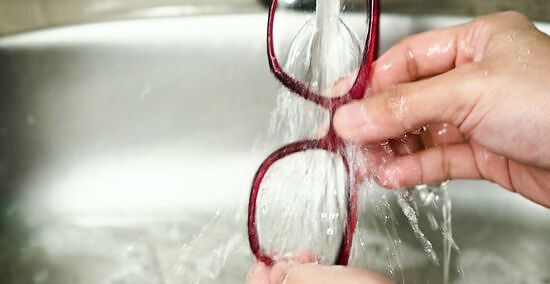
Run your glasses under warm water to remove the soap. Hold your glasses by the arm again and run them under warm water. Make sure you wash off all of the soap residue so that your lenses dry clear.
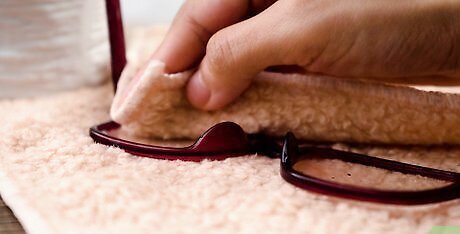
Pat your glasses dry with a microfiber cloth. Shake off any excess water into the sink and use a clean and dry microfiber cloth to pat your lenses dry. Try not to wipe your lenses too much, as it could cause them to dry with streaks. If your glasses dry with streaks on them, it could mean there is soap residue left. Run your glasses under warm water again to see if the streaks disappear.
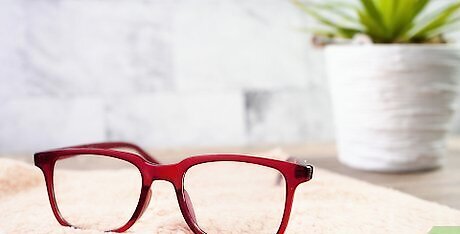
Clean your glasses at least once a week. Keeping glasses clean makes them less prone to scratching and damages. Try to clean off your glasses at least once a week or as soon as you notice a build-up of dirt or oil.
Cleaning Spray
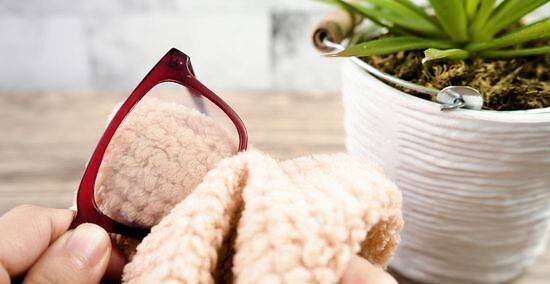
Wipe your lenses with a microfiber cloth. Use a clean, dry microfiber cloth to remove any large areas of dirt, debris, or oil. Try to get rid of as much debris as you can before you clean them, especially when using a glasses cleaning spray. If you don’t have a microfiber cloth available, you can gently blow the dirt and debris off of your glasses.
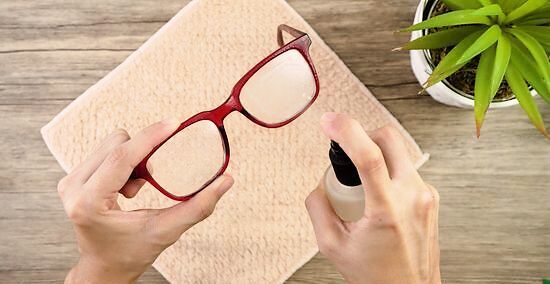
Spray your lenses thoroughly with eyeglasses spray. Hold the eyeglasses spray about 1 in (2.5 cm) away from your lenses. Coat the lenses thoroughly in the spray, paying special attention to any areas that are especially oily or dirty.Warning: If your glasses have an anti-reflective coating on them, make sure the spray that you are using is safe to spray on your glasses. Check the bottle to make sure it is anti-reflective coating safe. It is important to coat your lenses in the spray so that you can avoid dry-wiping them. You can find eyeglasses cleaning spray at most drug stores.

Dab your lenses dry with a microfiber cloth. Use a clean and dry microfiber cloth to gently dab the cleaning spray off of your lenses. Make sure you remove all of the spray so that there are no streaks of product left. You can also use a clean, lint-free towel if you don’t have access to a microfiber one.
Best Practices for Eyeglasses
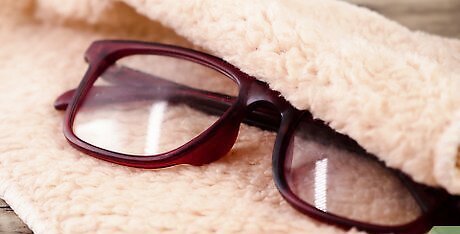
Minimize the amount of times you wipe your glasses on your clothing. Although it can seem like the most convenient option, wiping your glasses on your shirt or pants puts them at risk for scratches. If you have a large piece of dirt or debris on your lenses, dry wiping them with an article of clothing could scrape it across and permanently damage your lenses. If you do need to wipe your glasses on your clothes, try to blow off any dirt or debris before you wipe them off.
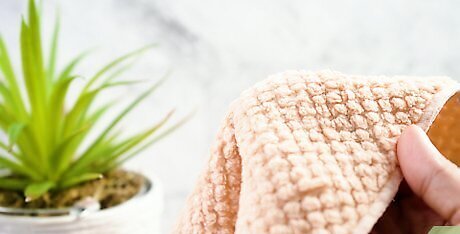
Use a microfiber cloth to wipe your glasses once a day. Oil, dirt, and grease can build up on your glasses from normal wear and make your lenses harder to see out of. Try to wipe down your glasses at least once per day with a microfiber cloth to remove any residue that might be there. You can buy microfiber cloths at most home goods stores or wherever you purchased your glasses.
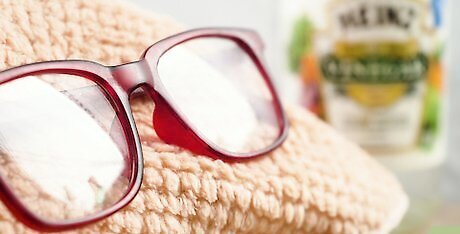
Avoid using vinegar or bleach as a cleaning agent. Highly acidic or basic products like vinegar and bleach break down the coating on your lenses and make them fail much faster. Stick to using mild dish soap to clean your lenses to preserve the coating on your lenses and make them last much longer. Most glasses are coated with a UV protectant.
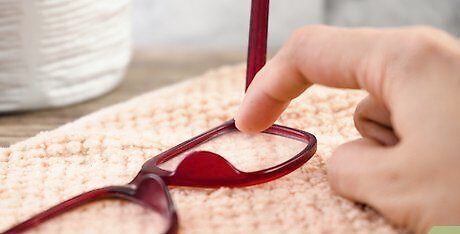
Minimize the amount you touch your lenses. Your hands have natural oils that leave a residue on everything that you touch. The more you touch your glasses, the more oil will get on them throughout the day. Keep your hands away from your glasses as much as you can.Tip: If you are touching your glasses constantly to push them back up onto your nose, you may need to get your glasses tightened so that they fit your face properly.
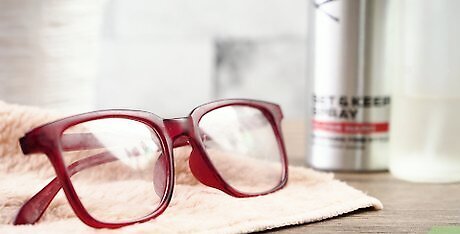
Keep your glasses out of the way of hairspray and perfumes. Aerosol sprays leave a fine coating of chemicals on whatever they land on. Products like these can make your glasses seem cloudy or foggy. Try to keep your glasses away from the area that you spray hairspray or perfume. Try putting on your glasses after you’ve gotten ready for the day to keep them cleaner.
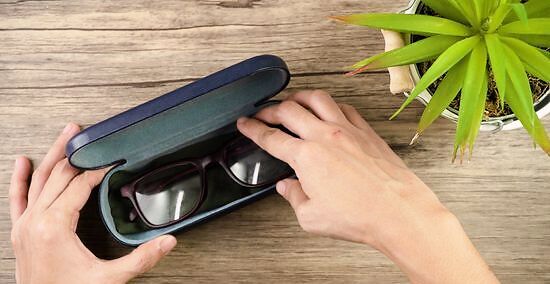
Put your glasses in a case whenever you are not wearing them. Leaving your glasses in a backpack or purse can make them dirty much faster as they touch the inside of your bag. If you aren’t wearing your glasses, put them in a protective case that shields them from your book bag or satchel. Putting your glasses in a case also protects them from being jostled around and broken.




















Comments
0 comment